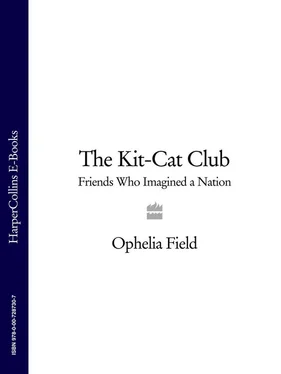1 ...8 9 10 12 13 14 ...35 The heat of the scene before the pie-oven, as evoked by Ned Ward, was similarly symbolic. Warmth was considered a Whig characteristic, as shown by the anecdote in which the Kit-Cats asked Mr Cat to bake some pies with the poetry of the comic dramatist Thomas D'Urfey used as baking paper, to test that poet's Whig principles and fitness for membership. The story goes that the members complained when the pies were not baked through, to which Mr Cat replied that D'Urfey's writings were so cold they were cooling the dough. They were not, in other words, sufficiently Whig.
Pies were certainly baked on discarded bits of writing in that paper-frugal century. Dryden described worthless pieces of poetry as ‘Martyrs of Pies’ 19 and Addison later mused with false modesty that his journalism would ‘make a good Foundation for a Muttonpie, as I have more than once experienced’. 20 The nice image of Mr Cat's customers picking the last of the ‘kissing crust’ (the old name for the soft under-crust of a pie) off a piece of blank verse, the ink transferring from browned paper to golden pastry, was not fanciful but real.
As pies and puddings were considered the best of English cookery, the Club's favourite dish would have signified the founders' selfconsciously English, as opposed to French, tastes. The pies were also regarded as humble fare symbolizing the condescension (in its archaic, entirely positive sense) of aristocrats conversing with struggling, lowly born authors. This was made clear by one playwright's hope that his play, even if lacking in delicacy, might nonetheless suit the taste of great men just as ‘A Kit-Cat is a Supper for a Lord’. 21
The Kit-Cat authors were never literally starving for a meal, but they were certainly hungry for recognition and fame. Patrons such as Dorset, Somers and Montagu were therefore essential guests at Mr Cat's table. Throughout the Kit-Cat Club's several incarnations, from its 1690s' foundation to its demise some two decades later, patronage was to remain the single most important constant in the Club's story—the mechanism that made it tick.
Whereas writing for money was condemned by Renaissance critical theory as limiting an author's imaginative freedom, patronage allowed its recipients to profit without feeling sullied by the pecuniary motives of Grub Street hacks (one of whom, in their eyes, was Ned Ward). The Kit-Cat Club provided, in other words, the same ‘cover’ as verse letters—mimicking an earlier, courtly way of doing things. Verse letters in the 1690s pretended to have a readership of one, the aristocratic addressee, while actually having print runs of hundreds. The Club's authors pretended to be a carousing circle of amateurs with private incomes, when really they were piecing together their livings out of day-jobs, book sales and audience figures.
They hoped to be permitted exceptions to the rules of class, familiarity being among the most valuable gifts that a noble patron could bestow. For a writer to be admitted into a nobleman's ‘conversation’ implied a rise in status with tangible benefits in terms of one's creditors. It was not simply a flattering attention from a social superior; it was an asset that could be spent afterwards as though it were hard cash.
The tantalizing promise of patronage was meant to guarantee a certain level of conversational virtuosity at the Kit-Cat Club, in contrast to the conversation at the Witty Club, where Dryden's approbation was the only reward on offer. Though Will's Coffee House was supposed to be an ‘Exchange for Wit’, the fact that there was more profit in publishing a good line than throwing it away on one's friends caused the ‘Wit-Merchants’ to meet there, it was said, ‘without bringing the Commodity with them, which they leave at home in the Warehouses’. 22 A character in one of Congreve's plays similarly refers to wit as an alternative currency, in which writers are naturally richer than their patrons: ‘None but dull rogues think ; witty men, like rich fellows, are always ready for all expenses; while your blockheads, like poor needy scoundrels, are forced to examine their stock and forecast the charges of the day.’ 23
A later satirical play about the Kit-Cat Club referred to certain members ‘who only listen in it’ 24 —these were the aristocratic patrons who came in the spirit of an audience, ready to exchange one currency for another. It was a fair exchange, in so far as a poet might determine a patron's reputation among contemporary readers (and voters) and in the eyes of posterity. Tonson shrewdly realized that busy, wealthy and powerful men would gladly pay for the glamour of association with popular writers such as Vanbrugh and Congreve, or at least would prefer to play patrons than become targets of their satire. As Ned Ward put it, some Whig grandees joined ‘in hopes to be accounted wits, and others to avoid the very opposite imputation’. 25
The Kit-Cat authors, in their poetry and classical translations, self-interestedly perpetuated the idea that a well-rounded nobleman must be a generous patron. They constantly reminded their superiors that there was a parallel value system, independent of inheritance, in which the nobly born were expected to compete, if not with their own literary talent then at least as discerning patrons. The Kit-Cat Club's broad membership implied a hierarchy based on values other than birth and wealth: ‘Though not of Title, Men of Sense and Wit.’ 26
Prior and Stepney, for example, showed an imaginative sensitivity throughout their writings and classical translations to the theme of ‘meanly born’ men who led virtuous lives, or proved themselves great senators, lawyers or soldiers. In his translation of Juvenal's Eighth Satire , Stepney contrasted the great achievements of lowborn Cicero, or Tully ‘the native mushroom’, to highborn Rubellius whose useless life was no better than that of ‘a living statue’. 27 It was an old Christian idea, given a fresh political edge: the natural corollary, or ultimate logic, of the Whig theory of kingship, that each man had to earn his own honour in this world.
Lord Dorset was flattered as ‘bountiful Maecenas’, especially after his appointment as the King's Lord Chamberlain. This was a reference to the Roman patron whose circle had included Virgil and Horace, and who was therefore the prime classical model for Kit-Cat patronage. Dorset had been a patron to Tonson's authors, including Dryden, since before the Revolution, and when Tonson published Congreve's second play, Love for Love (1695), it was with a dedication to Dorset attached—a transparent bid by Congreve to become another of the Earl's favoured ‘Boys’. The publisher tended to broker the patronage of Somers when one of his prose authors needed subsidy, but that of Dorset when it was an aspiring poet or playwright.
The contemporary writer John Macky emphasized Dorset's role as one of the Kit-Cat Club's ‘first founders’, 28 alongside Tonson and Somers, and if this was indeed the case, then Dorset's motives were largely nostalgic and escapist. By the mid-1690s, Dorset was in his late fifties and his second marriage was souring because of quarrels over his wife's estate. He was therefore spending more time in town, pretending to a bachelor's lifestyle. At Charles II's Restoration Court, Dorset had enjoyed a dissipated youth, one of the ‘Merry Gang’ of poets and rakes alongside the infamous Earl of Rochester. Dorset had fought in street brawls and duels, been Nell Gwynn's lover and survived nearly fifteen years of nocturnal, riotous, self-destructive living. He had escaped frequent brushes with the law, including charges of murder and of gross indecency after a drunken appearance stark naked on a tavern balcony. Now in the 1690s, having a mid-life crisis, Dorset wanted to recapture the carefree spirit of his youth, or at least help the next generation of poets enjoy a similar camaraderie.
Читать дальше












